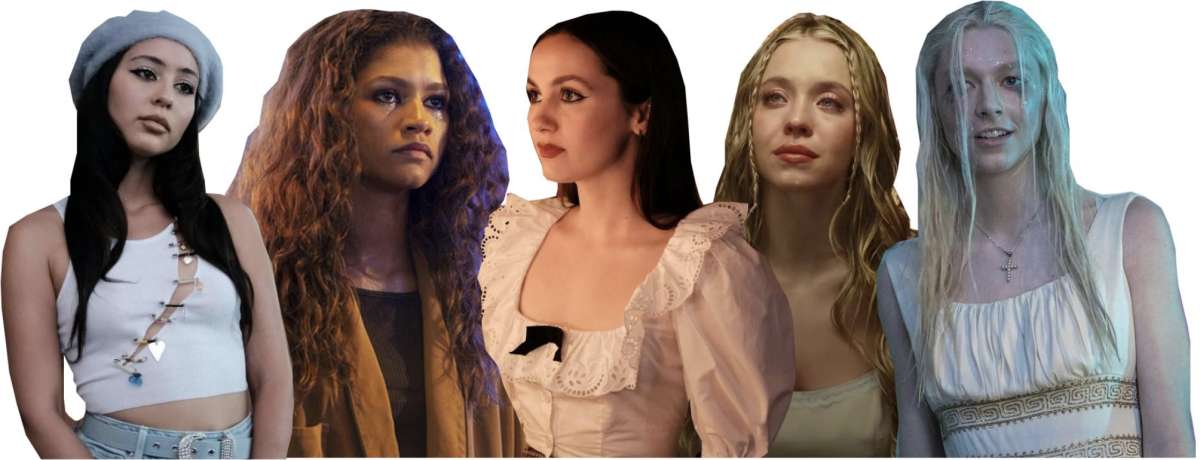The release of “Euphoria’s” massively popular second season earlier this year has evoked a lot of talk amongst today’s teens and young adults. From controversy over its many plot holes to collective hate for Cassie Howard, its grasp on all social media platforms has been wildly impressive.
As a devout watcher since its first release in 2019, I’ve been engaged in “Euphoria” discussions that consider the many aspects of this series. One conclusion I’ve come to is: we need more of it.
“Euphoria” follows the story of a high school drug addict, Rue Bennett, and many of her peers. Viewers are introduced to several characters throughout the show, all connected through drama or shared struggles.
Some of these characters include: Cassie Howard, a beautiful girl who struggles with insecurities and dependence on men thanks to her absent father. Nate Jacobs, the immensely complicated star quarterback who lives on the cusp of sociopathy. Jules Vaughn, the new girl in town and a transgender woman navigating her relationship with femininity. Fezco, a dropout drug dealer and a great example of a good person forced to do bad things because of the hand they’ve been dealt. These are just a few of the intricate characters “Euphoria” explores.
Whether it’s the captivating cinematography, amazing performances from its actors, its innovative soundtrack by Labrinth or its unpredictable plotline, “Euphoria” has never ceased to impress me.
While popular series such as Glee, Gossip Girl, Teen Wolf and others will remain classics, “Euphoria” shows every aspect of teenage struggles in their totality. The series has been an astonishing breakthrough in teen dramas due to its portrayal of 21st-century teenage issues.
Many teen drama series and movies have provided great representations of teenagers with drug dependency, but “Euphoria” went the extra mile in its honesty about the rough journey. Rue, played by Zendaya, is “Euphoria’s” main protagonist and a drug addict. Season one starts off with Rue’s release from rehabilitation and her subsequent messy navigation of sobriety. From her literal highs and lows, “Euphoria” opens a whole new perspective to the world of addiction as told by its director, Sam Levinson, a former drug addict himself.
Throughout the airing of “Euphoria” episodes, there were many sentiments offered on social media platforms that “Euphoria” glamorizes underage drug abuse.
One major example of this criticism came from the Drug Abuse Resistance Education (D.A.R.E) program. “‘Euphoria’ chooses to misguidedly glorify and erroneously depict high school student drug use, addiction, anonymous sex, violence and other destructive behaviors as common and widespread in today’s world,” D.A.R.E wrote in a statement.
D.A.R.E’s statement that dangerous behavior is normalized within “Euphoria” isn’t entirely wrong. “Euphoria” does convey the notion that high-risk situations are common in high school. Critics claim that by doing so, “Euphoria” offers the false narrative to high schoolers that these actions are normal for their age. But, as a high schooler myself, I’d argue that high schoolers are able to recognize that many of the events within “Euphoria” are in fact not normal.
Even if that message doesn’t reach its audience, the show clearly communicates that these situations are dangerous. For example, Jules’ encounter with Cal Jacobs (Nate Jacobs’ father, who is significantly older than Jules) through an anonymous dating app depicts the risk of the situation patently. The scene takes place in a daunting motel and is filmed with dark, menacing color tones. The ambience presented is ominous, and Jules is not portrayed as having enjoyed the perilous meeting where she is forced down by Cal and recorded despite not having given consent to do so.
Season two goes even further to illustrate the harsh consequences of drugs. Demonstrating the toll drug dependency took not only on Rue herself, but on her relationship with family and friends, was intense and raw. Episode five of season two was especially real. Within the sixty minutes, Rue has one of her worst withdrawal episodes. She goes on a rampant search for drugs and ends up verbally and physically hurting many of those close to her.
The performances of actors Zendaya, Leslie Bennett and Storm Reid in this episode left me in shock. As someone with an uncle who has struggled with alcoholism for over two decades, seeing Rue’s relentless dependency and the effect it had on her mother and little sister was scarily authentic. As the season progressed, I began to understand my uncle and his struggles; his world, which I’d never been able to grasp, opened up to me through Rue.
That’s why such uncensored representation is so important. When the unseen and misunderstood are given a real portrayal of their battles, it has the power to change their relationships and own lives.
“Euphoria” doesn’t shy away from presenting other very real issues today’s teenagers face, such as trauma, absent fathers, mental health struggles, manipulative relationships and toxic masculinity. Depicting these issues that aren’t often discussed within other teen dramas is vital to those they are representing. For one, it starts discussions about these experiences and brings more awareness to them. Secondly, someone who is exposed to these issues might feel less alone knowing others have experienced them too. Seeing these issues on screen might even inspire teens to open up about their experiences to their parents, friends or others.
The harsh depictions of sex, drug use and violence throughout the series can be uncomfortable to watch, but if they weren’t, “Euphoria” writers wouldn’t accomplish the show’s aims. Showing the raw reality of these issues is exactly how representation should be done. Watchers who have never touched the surface of these worlds delve straight into them, opening a completely new perspective.
Young adults and teenagers are deserving of series such as “Euphoria;” dramas that stray from unrealistic, sappy narratives that rarely discuss actual struggles that teenagers experience in today’s world. “Euphoria” has become the blueprint, and now it’s time for other teen dramas to start providing genuine representation.
By Sophia Jones

































































